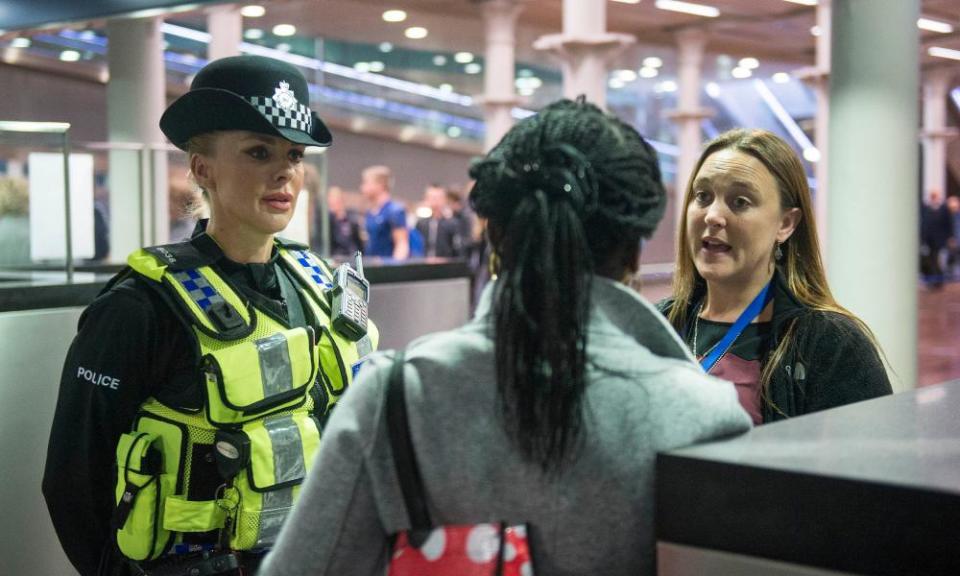Racism label should not deter British police from FGM fight, says officer

Claims of racism over female genital mutilation (FGM) investigations should not be allowed to disrupt a police initiative targeting families coming into the UK from countries where the practice is prevalent, one of the officers leading the project has said.
Insp Allen Davis of the Metropolitan police’s child abuse and sexual offences command is part of Operation Limelight, a team of about 30 police officers, Border Force officials and social workers who meet flights coming in from countries where children might have been taken for FGM over the summer holidays. Among others they focus on flights coming into the UK from Egypt, Nigeria and other African countries including Ethiopia.
“It’s important not to let fears of accusations of racism get in the way of protecting children,” Davis said. “The thing you have to remember with FGM is that it blights a girl’s entire life. We have to work to ensure that children are safeguarded.”
Davis told the Guardian female genital mutilation remained a problem in Britain and that it was important to guard against complacency.
“No one should assume there’s not an issue here,” he said. “We’re working with communities not against them, but we need to understand what’s going on and the police remain absolutely committed to eradicating FGM, which is child abuse and needs to be understood as such.”
More than 3 million girls are at risk of FGM each year in Africa. Figures for the extent of the practice in the UK are difficult to establish, but police believe girls in Britain are still being cut, or are being taken out of the country to undergo the procedure, and have said they are determined to prosecute anyone they believe is guilty of the crime.
Davis said FGM, which has been illegal in the UK since 1985, was not a crime that would disappear quickly, and it was imperative that anyone who might have information about it remained vigilant.
Last week Davis led an action at Heathrow by Operation Limelight. In 2003, and again in 2005, the legislation was revised to make it an offence to arrange FGM outside Britain for UK citizens or permanent residents, and police want to show they are taking a zero-tolerance approach.
The police and border officials have been running Operation Limelight for the past four years. They concentrate their efforts on six periods in the year – before the start and at the end of the main school holidays.
The initiative was launched at Heathrow but has been expanded to regional UK airports. This month, for the first time, a similar operation took place at the Eurostar terminal in London, after reports that some families were trying to bring children home at the end of what is known as “the cutting season”.
At Heathrow this week, several girls and their mothers were taken aside for a conversation with a police officer who explained the procedure and its illegality.
Davis said: “We want to make sure they have knowledge about it, and that they realise it’s wrong and it should not be happening, because for them knowledge is power.”
Some of the mothers had been cut themselves, and came from communities where generations of women would have undergone FGM. “As a cultural practice it goes back thousands of years, and we know we’re not going to eradicate it overnight,” Davis said.
Operation Limelight has spawned a similar programme in the US, with initiatives similar to that at Heathrow carried out at JFK airport in New York.
At Heathrow, the action involved officials who spoke such languages as Swahili, Arabic, Yoruba, Urdu and Igbo.
“Do you have any young girls with you?” a Border Force officer asked passengers disembarking a flight arriving at Terminal 2 from Abuja in Nigeria. Travellers underwent an extra passport check, and officials weeded out anyone travelling with girls and questioned them on the reason for their trip.
Most passengers took a good-natured approach to the delay, but some were irritated. “We recognise the difficulties – we’re trying to deal with an extremely sensitive issue with people who are coming off a long flight,” Davis said.
The operation targets particular flights, and the officers focus on families and groups from Africa and other parts of the world where FGM is practised.
Davis said: “The operation is about identifying girls at risk or who have undergone FGM, but it’s also about gathering information about how communities might be getting round the current safeguards to continue to practise FGM.”
Flights from Cairo were targeted because of a particular worry that some parents were taking girls to undergo FGM in a medical setting in Egypt.
The police face significant difficulties in enforcing the law against such a hidden procedure. One family caught the attention of officers this week after the father told a border official he agreed with FGM and would be ensuring his daughter underwent it. As other officials moved in to talk to him further, he retracted his initial comments, saying he had not understood the question.
“We know people aren’t necessarily going to tell the truth, and we act a lot on our gut instinct,” Davis said. “But one important aspect of this operation is to signal to communities where FGM is practised that we take the ban on it extremely seriously, and will do all we can to prevent children being taken abroad for it.”

 Yahoo News
Yahoo News 